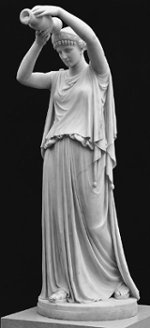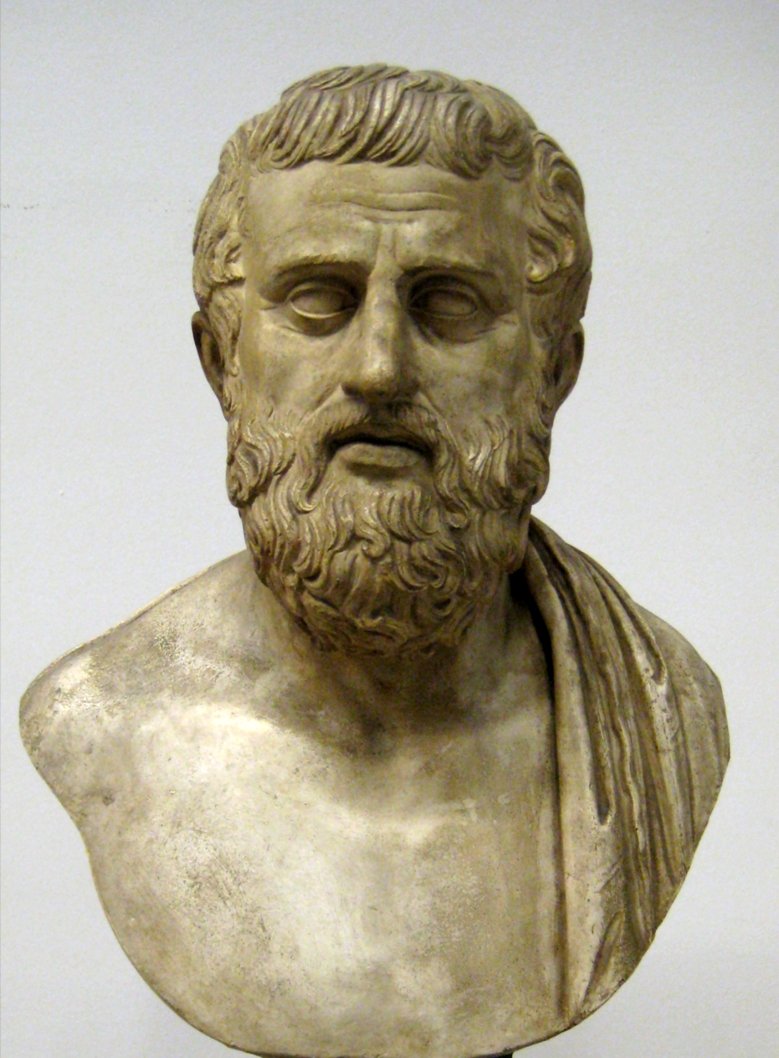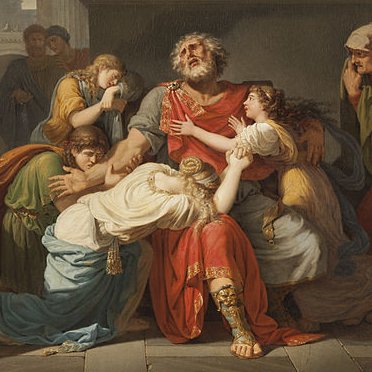
Oedipus at Colonus
Oedipus at Colonus by Sophocles
Produced posthumously, Sophocles’ last tragedy, Oedipus at Colonus, is undoubtedly a fitting farewell to an exceptional playwrighting career. Frequently compared to Shakespeare’s King Lear, the play begins many years after the events which led to Oedipus blinding himself in Oedipus Rex. After a long period of wandering, the accursed and very old Oedipus, accompanied by his daughter Antigone, arrives at Colonus, a suburb of Athens (and, poignantly, the birthplace of Sophocles). A villager approaches them and demands that they leave since they have trespassed on the sacred grove of the Eumenides (the former Erinyes). It is a sign: Oedipus knows from a prophecy that this should be his final destination and his burial ground. So, he appeals to the Elders of Colonus to let him stay or, at least, to let their king (Theseus) decide on his fate. As soon as they agree to do the latter, Ismene, Antigone’s sister, unexpectedly arrives at Colonus, announcing that Eteocles and Polynices are preparing for a war for the throne of Thebes, and adding that Creon has been sent by the Thebans to bring Oedipus back to their land. Apparently, an oracle has proclaimed that Oedipus should bring many boons to the city in which he is buried, so both of Oedipus’ sons and Creon want to bury him at Thebes so that theirs is the only land which receives the blessing from the gods. Oedipus curses his sons and asks the Elders of Colonus for protection. Theseus arrives, and he grants him precisely that, making him a citizen of Athens. Shortly after, Creon arrives from Thebes and starts blackmailing Oedipus: he has already taken Ismene captive and now forcibly seizes Antigone. Summoned by the Elders of Colonus, Theseus promptly intervenes and saves them from confinement. He also informs Oedipus that a stranger has come from Argos to speak to him. It is none other than Oedipus’ son, Polynices, who has arrived at Colonus to beg for his father’s help. Oedipus declines it, cursing him and his brother yet again—to kill each other during the war for Thebes. A fierce thunderstorm sent by Zeus announces that Oedipus’ time has come. Only Theseus is allowed to witness his peaceful and serene death.
Date and Historical Background
According to an ancient hypothesis (or “introduction”) to Oedipus at Colonus, the play was produced after the death of Sophocles by his grandson and namesake, Sophocles the Younger, son of Ariston. From the same hypothesis we also learn that the play was first performed during the archonship of Micon (402–401 BC), four years after the death of the author, who (according to most authorities) died while Callias Angelides was in office (406–405 BC).
Characters and Setting
Characters
• Oedipus, formerly King of Thebes, now in exile; son of Laius and Jocasta, husband of his mother, and father with her of Antigone, Ismene, Polynices, and Eteocles
• Antigone, Oedipus’ daughter
• Ismene, Oedipus’ daughter
• Polynices, Oedipus’ son
• Creon, Jocasta’s brother
• Theseus, King of Athens
• An Athenian, a villager of Colonus
• A Messenger, one of Theseus’ attendants
• Chorus of the Elders of Colonus
Setting
The play is set in the grove of the Eumenides at Colonus, a village located just outside Athens.
Summary of Oedipus at Colonus
Prologue
Blind and in the clothes of a beggar, scarred and worn out by life, but still impressive in his stature and noble-looking, the once-mighty Oedipus, led by his daughter Antigone, enters the stage. Though both are aware that they should be near Athens, neither of the two knows the exact location of the grove they are treading.
Antigone seats her father on a rock and is about to go in search of information when a villager suddenly appears. He tells Oedipus that is “unholy to tread upon” the ground they are treading and asks him to leave the seat. “To which of the gods is it sacred?” “The all-seeing Eumenides,” answers the stranger.
Surprisingly, upon hearing that, Oedipus refuses to leave, and, instead, asks the Stranger to summon the king of Athens, Theseus, promising that both he and the city will have a great gain if he is granted just a small service. The Athenian leaves to tell the people of his district of Oedipus’ arrival, and, left alone, Oedipus tells Antigone the reason for his refusal to leave the place.
Apparently, years ago, while predicting his misfortunes, Apollo also told Oedipus that he should find rest one day, soon after reaching the seat of the Eumenides. As soon as he reveals this to Antigone, his daughter overhears footsteps approaching them.
Parodos (Entrance Song)
It is the Chorus, consisting of fifteen Elders of Colonus, all informed by the villager about Oedipus and anxious to find out more about this perpetrator. Oedipus promises to reveal his identity to them, but only after they promise him to not force him out of Attica. The Elders of Colonus make this promise, and Oedipus tells them who he is. “Out from your seat!” shouts the Chorus, offended and suddenly uninterested in its commitment. “Away from my land with all speed, that you may not fasten some heavier burden on my city!” Crying, Antigone implores them to allow her father to stay.
First Episode
The Elders explain to Antigone that, although they pity both her and Oedipus, they are much more afraid of the gods, and are unwilling to incite their anger. Oedipus reproaches them: what kind of Athenians are you, he asks them, if you are reluctant to shelter an outraged stranger? After all, Athens is most famous for this trait. Moreover, he is not just anyone, but a former king, one who has never done anything wrong knowingly. Besides, he brings Athens a great blessing. However, he refuses to reveal it until Theseus joins them. The Chorus agrees to wait for their king.
At this moment, Ismene, Antigone’s sister, arrives from Thebes. She reveals to Oedipus that Polynices and Eteocles, his sons and her brothers, have all but started a war. After Eteocles refused to abdicate in favor of his brother, Polynices has gone to Argos to gather up an army and attack Thebes. And there’s more: they have found out that the safety of the city depends upon them honorably burying Oedipus. So, Creon is about to arrive in Colonus to fetch Oedipus and bring him back to Thebes.
Oedipus is angered by the news: nobody cared for him before this oracle and, now, suddenly, everybody does. He curses his sons for putting the kingdom and their personal glory before him. “Let them send Creon to seek me—or whoever else is mighty in Thebes. For if you, strangers,” Oedipus turns to the Chorus, “with the help of the dread goddesses who reign among your district, are willing to defend me, you will obtain a great savior for this city and troubles for my enemies.”
After a brief exchange between Oedipus and the Chorus, Theseus, the king of Athens, enters the stage. Oedipus immediately makes his desire clear: to be protected by Athens while he’s alive, and buried there after his death. If so, he says to Theseus, Athens will profit for long after his death. However, since his sons will come to take him back to his hometown, protecting him may mean risking war with Thebes. Theseus gives Oedipus the promise to protect him at all costs, and, as proof of this promise, makes him a citizen of Athens. He then leaves the scene.
In the second choral song (the first stasimon)—which is almost as famous as the Ode to Man from Antigone—the Chorus celebrates the beauties and achievements of Athens, now Oedipus’ adopted homeland.
Second Episode
“Land that is praised above all lands, now it is your task to make those bright praises seen in deeds!” exclaims Antigone upon noticing Creon nearing her and her father.
At first, however, it seems as if Creon has come in peace. He addresses the Elders of Colonus in honorable terms and claims that he is too old to take part in some kind of a violent ploy, especially not one against a powerful state. He has simply come to take Oedipus back to where he rightfully belongs, “in the House of his fathers.”
Oedipus begs to differ: “you have come here with fraud on your lips,” he says to Creon, “and with a tongue keener than the edge of a sword.” Creon attempts to appease Oedipus’ anger, but, failing to do so, he changes his strategy: “One of your two daughters I have myself just seized and sent away,” he reveals to him. “The other I will drag off immediately.”
As soon as he says this, his attendants violently take Antigone away, and Creon threateningly tells the helpless Oedipus that unless he changes his mind, her daughters will never see their father again. Fortunately, just a moment later, Theseus appears: he has heard the cries while making a sacrifice to Poseidon and wants to know what has caused them.
Upon learning everything from Creon and Oedipus, he turns to the former and orders him to immediately lead him toward the captured maidens. Creon tries to talk his way out of this but eventually succumbs.
The Chorus, in the second stasimon, expresses joy at this outcome and predicts that the rescuers and the rescued, with the help of the gods, will soon come back to them, glad and unharmed.
Third Episode
This is precisely what happens: escorted by Theseus and his attendants, Antigone and Ismene return. Upon hearing their voices, Oedipus expresses his eternal gratitude to Theseus, who humbly replies that he has done nothing more than what he had been bound by duty.
There is one more thing, he adds. A kinsman of Oedipus from Argos has placed himself as a suppliant at the altar of Poseidon, and asks to speak to his relative. Should he allow it? Oedipus, realizing that this could only be his renegade son, Polynices, implores Theseus to spare him the torment. Antigone, however, manages to change his mind.
Theseus leaves to inform the supplier of this decision, and the Elders of Colonus, afraid that another bad thing may happen to Oedipus, burst into a pessimistic song (the third stasimon). “Not to be born is, beyond all estimation, best,” they sing, “but when a man has seen the light of day, this is next best by far, that with utmost speed he should go back from where he came…”
Fourth Episode
Polynices arrives, alone and in tears. He begs both his father and his sister for forgiveness, but, in reply, he gets nothing but a plea by Antigone to state the real objective of his visit.
So, Polynices reveals everything: that he has already gathered his Argive allies and is about to attack Thebes; that he knows, just like his brother, that if Oedipus is with him, he will win the war; that if that happens, he promises to bring both Oedipus and his house back their glory.
As expected, instead of moving him, the appeal only angers Oedipus. “Had these daughters not been born to me to be my comfort,” he exclaims, “in truth, I would be dead, for lack of help from you… You are no sons of mine!”
“Take these curses which I call down on you,” he goes on, “most evil of evil men: may you never defeat your native land, and may you never return to the valley of Argos; I pray that you die by a related hand, and slay him by whom you have been driven out. This is my prayer.”
Disappointed, Polynices is about to leave, when Antigone reaches out to him and implores him to abandon his mission lest he wants to see both him and his city destroyed. “That will not happen,” Polynices replies, asking only that she and her sister take care of his dead body (thus, linking the play to Antigone).
After Polynices leaves, the sound of thunder is heard. The Elders of Colonus are terrified, but Oedipus is not. He already knows that it is Zeus announcing that his time has come. He asks for Theseus to be summoned. Once the king arrives, he tells him to bury him at a place only he should know. As long as the secret of his grave is passed only between the kings of Athens, Attica should be safe and blessed.
Everybody but the Chorus leaves. Left alone, in the fourth stasimon of the play, the Elders pray for Oedipus’ soul.
Exodos (Exit Song)
A messenger, one of Theseus’ attendants, comes back and relays the story of Oedipus’ burial, disclosing that Oedipus allowed only the king of Athens to witness the manner of his death. The daughters enter and interrupt him. Antigone expresses her sadness that she will never be able to pay proper burial rites to her father, and, the moment she sees Theseus, asks him to reveal to her the grave of Oedipus. Theseus kindly reminds her of his pledge, and Antigone has no option but to give in.
Saddened, she asks that she and her sister are now escorted back to Thebes: maybe it isn’t too late for them to stop their brothers from killing each other. Theseus consents. “Consider the job done,” echoes the sentiment the Chorus of Elders, biding the maidens farewell.
A Brief Analysis
Frequently compared to Shakespeare’s King Lear, Oedipus at Colonus also features an old and banished king who, as Gilbert Murray says, “achieves a sort of change or conversion” by way of his suffering. Both plays—similar in more ways than one—are sort of redemption tales, but Oedipus at Colonus is much more hopeful, despite Oedipus being the more suffering of the two dethroned kings.
Hero Yet Again
Just as the gods destroyed Oedipus in Oedipus Rex—transforming him from a savior of a city to an outcast guilty of the most abominable sins known to man—they have now conspired to redeem him in Oedipus at Colonus, making him a formidable hero yet again. It is once again an oracle which changes everything. This time, it is one which predicts that Oedipus will bring everlasting fortune to the land in which he is buried. It seems that the other side of this prophecy is just as important: whilst the ones who accept him should prosper, the ones who turn Oedipus away are bound to face misery and suffering. After being banished by just about everybody for years, Oedipus is suddenly the man of the hour, for whose everlasting presence fiercely contest two great cities (Thebes and Athens) and several people (Polynices, Creon, Theseus). “When I no longer exist, then I am a man?” asks Oedipus Ismene early in the play. “Yes,” she answers, “for the gods now raise you up; but before they worked your ruin.” In Oedipus Rex, Oedipus discovered that he is punished for not being able to get away from his family. Now, he does the opposite: he rejects his relatives in favor of complete strangers. It is disputable whether he has made the right choice: precisely because of his decision, as we learn from the plot of Aeschylus’ Seven Against Thebes and Sophocles’ Antigone, three of his four children would end up dead, and Thebes, his city, would be left in ruins.
Fate vs. Free Will
Just like Philoctetes—and to the probable dismay of Aristotle—Oedipus at Colonus is an episodic play, in which “the acts succeed one another without a plausible or necessary sequence.” It may be the sign of old age: almost expectedly, Sophocles seems less worried about action and structure in his later works and is much more concerned about the lack of answers to the most persisting questions of life. What is truth? Is it objective and attainable, or subjective and beyond man’s reach? Are our lives beyond our reach as well? If so, are the mysterious gods who govern fate all-knowing and just or merely puppet masters without a plan? And is our only job here to accept their whims and impulses as they come? Oedipus raged against the oracles in Oedipus Rex, but accepts the sacred ground of the Eumenides as his final resting place without a fight at the beginning of Oedipus at Colonus. The former brought him misfortune; the latter restored some of his glory. Did Sophocles, in his final days, gave up on trying to uncover the mystery of the universe, acknowledging, just like Aeschylus, that it is not our job to change destiny, but to accept it whatever it is? After all, Oedipus maintains that he is not entirely guilty of his crimes, and yet, he accepts his punishment. Perhaps that is what Sophocles is trying to suggest: it is only in this Stoic endurance that we might find salvation and peace in our lives. It may seem a defeatist stance, but it is, in a way, a very optimistic message. In the end, isn’t persevering through misfortunes just another way of confessing ignorance and accepting the existence of a grand—even if ineffable and unfathomable—plan of the gods for all humanity?
Oedipus at Colonus Sources
There are many translations of Oedipus at Colonus available online, both in verse and in prose. If you are a fan of the latter, you can read Richard Claverhouse Jebb’s translation for Cambridge University Press here. If, however, you prefer poetry, feel free to delve into Gilbert Murray’s rhyming verse adaptation here.
See Also: Sophocles, Oedipus Rex, Antigone, Oedipus
Oedipus at Colonus Video
Oedipus at Colonus Associations
Link/Cite Oedipus at Colonus Page
Written by: The Editors of GreekMythology.com. GreekMythology.com editors write, review and revise subject areas in which they have extensive knowledge based on their working experience or advanced studies.
For MLA style citation use: GreekMythology.com, The Editors of Website. "Oedipus at Colonus". GreekMythology.com Website, 09 Apr. 2021, https://www.greekmythology.com/Plays/Sophocles/Oedipus_at_Colonus/oedipus_at_colonus.html. Accessed 19 April 2024.





